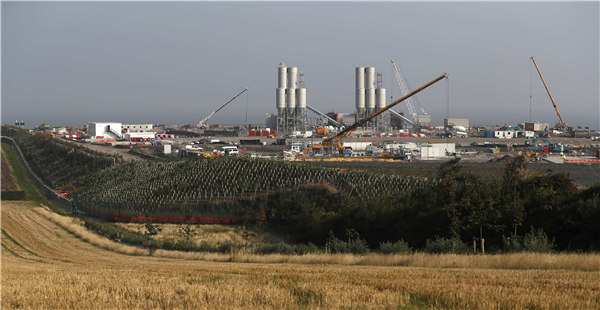 |
|
Hinkley Point C nuclear power station site is seen near Bridgwater in Britain, Sept 14, 2016. [Photo/Agencies] |
British Prime Minister Theresa May gave the green light to the controversial 18-billion pounds nuclear power station at Hinkley Point in England's west country, which will be built by France's EDF and part-financed by China.
A government statement said significant new safeguards would be built into any future nuclear power plant deals involving foreign governments or companies. Under the agreement to build Hinkley Point C, EDF, which is state-controlled, will only be able to sell its stake with prior notification or agreement from UK ministers.
Greg Clark, UK Secretary of State for Business, Energy and Industry Strategy, said: "Having thoroughly reviewed the proposal for Hinkley Point C, we will introduce a series of measures to enhance security and will ensure Hinkley cannot change hands without the government's agreement."
The measures will also apply to future projects, the government said.
China General Nuclear Corp, which will be involved in Hinkley, Bradwell and a third plant at Sizewell in eastern England, said in a statement it was delighted with the announcement.
"We are delighted that the British Government has decided to proceed with the first new nuclear power station for a generation. We are now able to move forward and deliver much needed nuclear capacity at Hinkley Point, Sizewell and Bradwell with our strategic partners, EDF, and provide the UK with safe, reliable and sustainable low-carbon energy.
"CGN and EDF have worked together in close cooperation for decades and this has laid a solid foundation for these three new nuclear projects. CGN looks forward to leveraging its 30 years' experience in nuclear construction and operation and playing an important role in meeting the UK's future energy needs."
EDF also expressed its delight in a statement.
"The approval of this construction project for two nuclear reactors on the Hinkley Point site in Somerset in the South-West of England marks the conclusion of ten years of preparation and rigorous planning.
"It will benefit from the joint strengths of the British and French nuclear industries, and will lead to the creation of 25,000 job opportunities on the site during construction, and will offer numerous opportunities for local and national businesses. An exchange of letters between EDF and the British authorities will render the discussions that took place over the last few days, to formalise their wish to take into account the EDF's commitment to retain control of HPC project."
Jean-Bernard Lévy, EDF Group CEO said: "The decision of the British Government to approve the construction of Hinkley Point C marks the relaunch of nuclear in Europe. It demonstrates the UK's desire to lead the fight against climate change through the development of low carbon electricity. "
May, who took over from David Cameron in July after he lost a referendum on continued British membership of the European Union, immediately announced a review of Hinkley Point which had been expected to go ahead in July.
The agreement, put together by Cameron and his chancellor, George Osborne, included 6 billion pounds of Chinese investment which was conditional on Chinese technology being used to construct a further planned nuclear plant at Bradwell-on-Sea, in eastern England.
"May has managed a good deal – she has managed to satisfy her domestic critics, satisfy her own cautious nature, and keep the Chinese on side," a government official familiar with her style, and who requested anonymity, told China Daily.
Linking the Bradwell project to Hinkley is key to China, because CGN is keen that its technology, never used in a developed country, gets the seal of approval of British safety rules. China will also be involved in financing another station using EDF technology at Sizewell.
Andrew Shepherd, Senior Energy & Infrastructure Analyst, at BMI Research, said the Hinkley project had become a litmus test over future investment in the UK in the wake of the referendum vote to leave the European Union.
"From the UK's perspective, it appears that Theresa May and her government have given the project the go ahead, in part, because Hinkley Point C has become a post-Brexit litmus test for investment in UK infrastructure. In approving the project, the government is essentially demonstrating that the UK is still an attractive and investable market for foreign investors despite its plans to leave the EU.
"Despite the government giving the project the go ahead, I still anticipate further delays ahead of eventual completion. The cost of the project will mean that Hinkley will remain controversial from a political perspective. Questions also remain over EDF's ability to deliver the project on time and within budget amid concerns about the company's ability to use its already stretched balance sheet to cover construction," he said.
Tim Yeo,a former Conservative member of parliament who now heads the pressure group New Nuclear Watch Europe, welcomed the approval. "The UK is open for business and will encourage future international investors to come to the UK."
"The government announcement today does not hinder Chinese interest to invest in Bradwell in any way, because the conditions have not changed for Chinese to invest in Bradwell, provided that Chinese nuclear technology is formally approved by the UK regulators," he added.
To contact the reporters: chris@mail.chinadailyuk.com and cecily.liu@mail.chinadailyuk.com